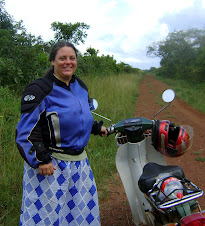Saturday, December 15, 2007
Ebola outbreak and medical supply theft.
Praise God that it appears the recent Ebola outbreak appears to be mostly contained for now, although new cases continue to show up. The 35 known deaths are tragic and more deaths are likely, but the potential toll could have been far, far worse. Included in those 35 dead are a number of health workers who gave their lives trying to help others. Sadly we know that the health center where they worked faced shortages such as a lack of gloves which likely contributed to their deaths. Recent headlines in the Ugandan paper shows that massive thefts of health supplies worth several hundred million shillings from the Ugandan National Medical Stores have been discovered. Stolen items included pain medicine, penicillin, IV fluids, bandages and gloves. If it were not for theft, would some of these people still be alive? We may never know exactly what happened, but human sin is part of life here on earth. One essential aspect in the effort of disease contol can never be stolen--that is health education. That is a gift which cannot be diverted and will serve for a lifetime.
Friday, December 14, 2007
Tip of the Antimicrobial Spear
photo by Samuel Nalwala
BUNDIBUGYO DISTRICT, UGANDA
A healthcare worker in the isolation ward of Mulago Hospital in Bundibugyo District wears full personal protective equipment. While government officials advice against shaking hands or gathering large numbers of people together, the lethal hemoragic fever caused by the Ebola virus infects both patients and their healthworkers. Though Budibugyo District is at the heart of the situation, as of December 8, there have been 101 cases and 22 deaths since August that have been attributed to the Ebola outbreak. With cases reported in Adjumani in West Nile, Mbale in the east, Masaka and Mubende in Buganda region and Kasese, Fort Portal (Kabarole) and Kanungu in western Uganda, fear of the spread of Ebola is affecting the country as a whole.
With the scarcity of healthcare workers, it is perhaps too easy for people in the west to look at the photo above and assume there are adequate resources to treat the epidemic. The reality is that in Uganda, health centers range from level one, which is basically a health care worker under a tree, to a level 5, which is a top referral hospital. The Bundibugyo hospital and the Kikyo Health Center IV combined have handled 33 cases. As of the most recent reports, there are 338 people under medical surveillance to see if they develop infections.
Kikyo Health Center IV's isolation ward is nothing like you've seen in the west. There are 2 watchmen, 2 cleaners, and 6 nurses. That's it. While the western hospital response would be full isolation in an ICU suite and a battery of antiviral drugs, the real need on the battlefield of emergent diseases is for community education, gloves, masks and gowns, booties, and detergents and disinfectants. Five healthworkers have died from Ebola in this outbreak as basics like gloves are not always available. Since there is such a shortage of healtworkers, the loss of these people also means many more people will be less able to receive medical care.
As NGO's scramble to form rapid response teams and stockpile supplies, the shortage of health care workers is critical.
While I did not travel to Bundibugyo District while in Uganda, I did spend time teaching on how to prevent the spread of infectious diseases. Missionary Dr. Scott Kellerman is likely the front line of this fight from recent reports. In Hoima, where SAMS missionary Shirley Morris is working and where we have helped empower community members with basic health knowledge, there is a district task force in place and is carrying out public education via FM radio and has recieved some treatment kits from the minstry of health.
Emergent diseases that are highly lethal, like the Ebola virus, tend to inhibit their own spread somewhat because they hit so hard and so fast. The basic reality is that victims who die in place in isolated communities often don't to spread the disease beyond the community. Unfortunately, fear can have devistating efffects. The health care worker's union is calling for health workers stationed at facilities which have not recieved proper personal protective equipment to flee the affected areas at this point. Infected people can and do leave an outbreak area, likely unaware that they are carrying the disease themselves. One isolation ward has been attacked by members of the local community who fear its presence. Family members told they could not care for infected patients have attacked staff. There have even been reports of ebola-infected patients attacking the medical staff when the staff could not provide transportation to a higher level health center.
Even before the recall, staffing was nothing like what was needed. With combined factors of both an existing shortage of healthcare workers, minimal outside help, and possibly infected healthcare workers and local residents fleeing affected areas, the potential for this situation to get worse is clearly there. The American CDC has been helpful, especially insetting up a testing lab to determine which patients are infected with ebola and which have other diseases instead.
As the disease spreads in areas where Islam is practiced, there is an additional health care concern. The bodies of the deceased are tradtionally washed prior to burial. The ministry of health has contacted the Mufti (Sheik Shaban Mubajje) and asked him to inform his subjects that the Muslims should not wash corpses, and that instead, they should be put in bags immediately and buried by trained heath care workers.
Friday, December 7, 2007

Approaching a local chuch in Buhima. In the church shown above, Janine helped with a health teaching class where she explained how to make a disinfecting solution using bleach (locally know as Jik). As Ebola threatens Uganda, basic health knowledge such as this is critical to preventing disease transmission.
Subscribe to:
Comments (Atom)


